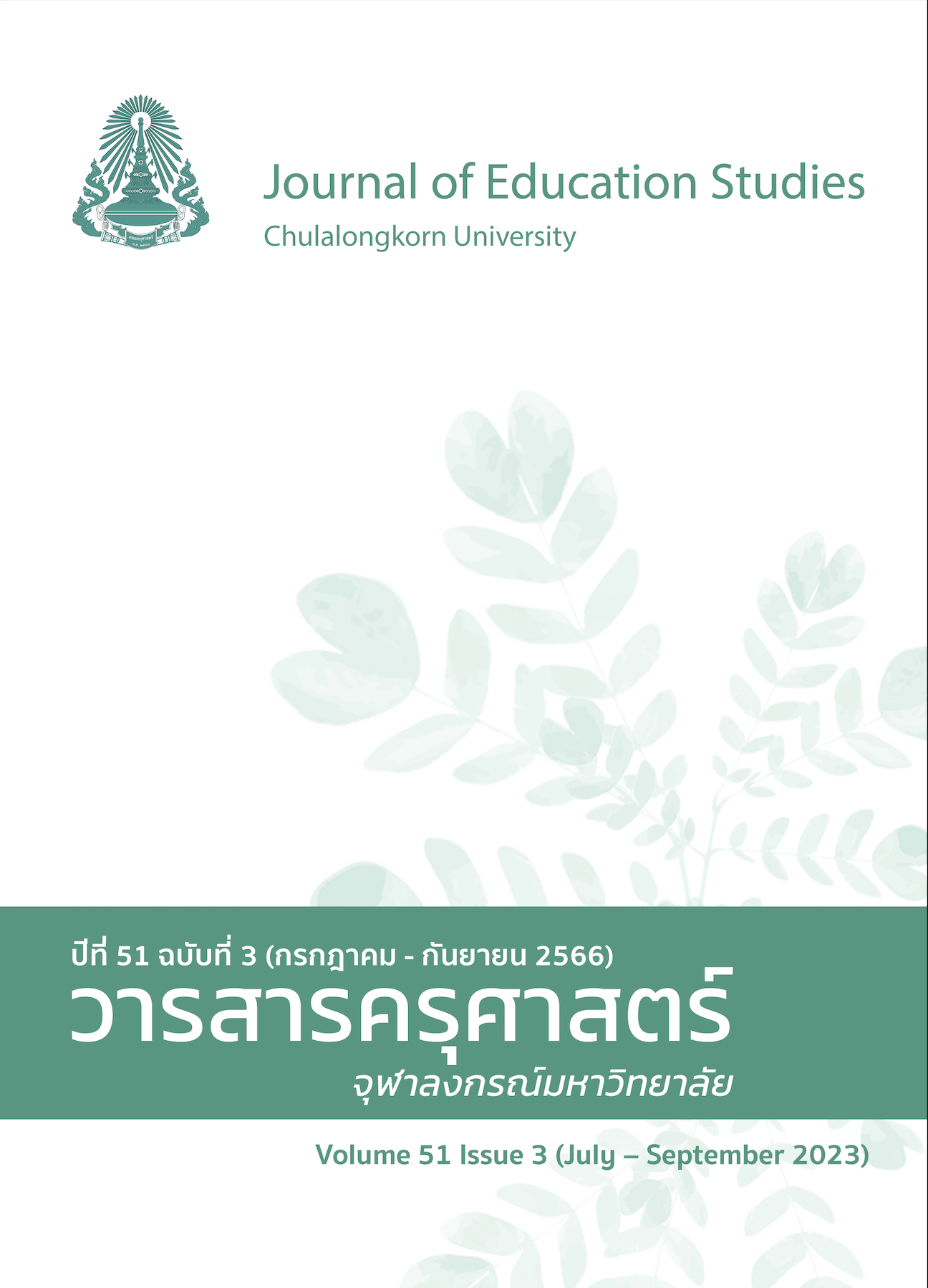Development of Educational Management Indicators in the Digital age for Secondary Schools
DOI:
https://doi.org/10.14456/educu.2023.19Keywords:
educational management, digital age, development of indicatorAbstract
The purpose of this research were to 1) develop of educational management indicators in the digital age. 2) to test the consistency of educational management indicators in the digital age based on a certain conceptual framework, related researches and empirical data. 3) testing measurement invariance across groups. It is development research consisting of 3 steps : Step1; develop of educational management indicators, the sample consisted of 356 administrators and teachers. The research instrument was a questionnaire 1 with .97 reliability coefficient.The analyses were; exploratory factor analysis : first order and second order. Step2; to test the educational management indicators model, the sample consisted of 1,120 administrators and teachers. The research instrument was a questionnaire 2 with .97 reliability coefficient.The analyses were; confirmatory factor analysis: first order and second order. Step 3; testing measurement invariance across groups, group1 ; small and medium school and group 2 ; large and extra-large school. The analyses were; Multi-group Analysis. The results showed that : 1) The educational management indicators in the digital age for secondary schools consist of 18 indicators and 6 components; Digital administrator, Digital Organization, Digital learner, Digital power of learning, Digital teacher and Digital citizenship. 2) The model of educational management indicators in the digital age for secondary schools showed congruence with the empirical data x2/dƒ= .871 p-value =.755 RMSEA=0 CFI=1 SRMR=.013 GFI=.999 and 3) The model of educational management indicators in the digital age for secondary schools had invariance between groups, but their factor loading varied.
References
คณะกรรมการอิสระเพื่อการปฏิรูปการศึกษา. (2562). แผนการปฏิรูปประเทศด้านการศึกษา. กรุงเทพฯ : สำนักงานเลขาธิการสภาการศึกษา.
ชัยยงค์ พรหมวงศ์. (2560) หน่วยที่ 14 เทคโนโลยีและสื่อสารการศึกษาสำหรับการจัดการศึกษาที่บ้าน (เอกสารการสอนชุดวิชาเทคโนโลยีและสื่อสารการศึกษา). สาขาวิชาศึกษาศาสตร์ มหาวิทยาลัยสุโขทัยธรรมาธิราช.
ธนกฤต สิทธิราช. (2558). อนาคตภาพการจัดการมัธยมศึกษาของประเทศไทยในสองทศวรรษหน้า. วารสารศึกษาศาสตร์มหาวิทยาลัยนเรศวร. 17(3), 71.
บรรจง ลาวะลี. (2560). บทบาทของผู้บริหารสถานศึกษาในยุคไรพรมแดน. วารสารมหาวิทยาลัยมหามกุฏราชวิทยาลัย วิทยาเขตร้อยเอ็ด. 6 (2), 214.
บัวชมพู ภูกองไชย. (2563). พัฒนาตัวบ่งชี้การบริหารเทคโนโลยีสารสนเทศและการสื่อสารเพื่อการเรียนรู้
ของโรงเรียนระดับประถมศึกษา สังกัดสำนักงาน คณะกรรมการการศึกษาขั้นพื้นฐาน ในภาค ตะวันออกเฉียงเหนือ.
[ดุษฎีนิพนธ์ปรัชญาดุษฎีบัณฑิต, มหาวิทยาลัยราชภัฏสกลนคร].
พงษ์เทพ จันทสุวรรณ. (2561). การทดสอบความไม่แปรปรวนของการวัดข้ามกลุ่ม : มาตรวัดภาวะผู้นำแรงบันดาลใจ.วารสารสมาคมนักวิจัย 23 (1), 45.
ภูชิศ สถิตพงศ์.(2562). การศึกษาแบบภควันตภาพ : ทางเลือกเพื่อพัฒนาการจัดการเรียนการสอน Ubiquitous Education: Alternative of Instructional Development. วารสารวิทยบริการ. 30(1), 230-241.
ยุทธศาสตร์ชาติ พ.ศ. 2561 - 2580. (13 ตุลาคม 2561). ราชกิจจานุเบกษา. เล่มที่ 135 ตอนที่ 82ก,หน้า 1-71.
วรพจน์ วงศ์กิจรุ่งเรือง.(2561). คู่มือพลเมืองดิจิทัล.กระทรวงดิจิทัลเพื่อเศรษฐกิจและสังคม.
วรภัทร์ ภู่เจริญ, จีระพงศ์ พรกุล และธนกฤต จรัสรุ่งชวลิต. (2550). KPI...ทําให้ง่าย ๆ. สามลดา.
วรรณกร พรประเสริฐ. (2562). การพัฒนาแบบวัดและเกณฑ์ปกติความเป็นพลเมืองดิจิทัลของนิสิต นักศึกษาในสถาบันอุดมศึกษา. [ดุษฎีนิพนธ์การศึกษาดุษฎีบัณฑิต, มหาวิทยาลัยนเรศวร].
วิจารณ์ พานิช. (2555). วิถีสร้างการเรียนรู้เพื่อศิษย์ในศตวรรษที่ 21. มูลนิธิสดศรี สฤษดิ์วงศ์.
วิชัย วงษ์ใหญ่ และมารุต พัฒผล (2562ก) การจัดการเรียนรู้ในยุค Disruptive Innovation. ศูนย์ผู้นำนวัตกรรมหลักสูตรและการเรียนรู้.
_______. (2562ข). การโค้ชเพื่อพัฒนาศักยภาพผู้เรียน. กรุงเทพฯ : จรัลสนิทวงศ์การพิมพ์.
สมหมาย จันทร์เรือง. (2563). ครูในยุค Disruption. สืบค้น 4 สิงหาคม 2563,
จาก https://www.matichon.co.th/columnists/news_1878563.
สรวงมณฑ์ สิทธิสมาน. (2562). สร้างพลเมืองดิจิทัลให้คงความเป็นมนุษย์. สืบค้น 23 กรกฎาคม 2563
https://mgronline.com/qol/detail/9620000058138.
สุกัญญา แช่มช้อย. (2561). การบริหารสถานศึกษาในยุคดิจิทัล. โรงพิมพ์แห่งจุฬาลงกรณ์มหาวิทยาลัย.
สุคนธ์ สินธพานนท์.(2560).ครูยุคใหม่กับการจัดการเรียนรู้ สู่การศึกษา 4.0. 9119 เทคนิคพรินติ้ง.
สุรศักดิ์ ปาเฮ. (2560). กระบวนทัศน์เทคโนโลยีการศึกษาในยุคดิจิทัล.แพร่ไทยอุตสาหกรรมการพิมพ์.
สำนักงานคณะกรรมการการศึกษาขั้นพื้นฐาน.(2562). แนวทางการนิเทศเพื่อพัฒนาและส่งเสริมการจัดการเรียนรู้เชิงรุก
(Active Learning) ตามนโยบายลดเวลาเรียน เพิ่มเวลารู้. หน่วยศึกษานิเทศก์สำนักงานคณะกรรมการการศึกษาขั้นพื้นฐาน.
สำนักงานพัฒนาธุรกรรมทางอิเล็กทรอนิคส์.(2563). รายงานผลการสำรวจพฤติกรรมผู้ใช้อินเทอร์เน็ตในประเทศไทยปี 2563
Thailand Internet User Behavior 2020. กระทรวงดิจิทัลเพื่อเศรษฐกิจและสังคม.
ศักดา ทัดสา. (2564).กลยุทธ์การใช้เทคโนโลยีสารสนเทศและการสื่อสารเพื่อการศึกษา สำหรับโรงเรียนประถมศึกษาขนาดเล็ก สังกัดสำนักงานคณะกรรมการการศึกษาขั้นพื้นฐาน ในภาคตะวันออกเฉียงเหนือ.
[ดุษฎีนิพนธ์ปรัชญาดุษฎีบัณฑิต, มหาวิทยาลัยราชภัฏสกลนคร].
อติพร เกิดเรือง.(2560). การส่งเสริมการเรียนรู้ในศตวรรษที่ 21 เพื่อรองรับสังคมไทยในยุคดิจิทัล, วารสารวิทยาลัยราชภัฏลำปาง. 6 (1),173–184.
อภิชาต ทองอยู่.(2562). คุยกับ ‘อภิชาต ทองอยู่’ ผู้ปั้นการศึกษาแบบ EEC Model สร้างอนาคตยุคใหม่ให้เด็กไทย. สืบค้น 31 มีนาคม 2563 จาก https://www.salika.co/2019/06/06/eec-model-future-of-education-apichart-thongyou/.
อภิสิทธิ์ เถายะบุตร. (2563). การพัฒนารูปแบบการเรียนการสอนห้องเรียนกลับด้านโดยใช้โมบายเลิร์นนิง เพื่อส่งเสริมความเป็นพลเมืองดิจิทัล สำหรับนักเรียนชั้นมัธยมศึกษาตอนต้น. [ดุษฎีนิพนธ์การศึกษาดุษฎีบัณฑิต, มหาวิทยาลัย
ศรีนครินทรวิโรฒประสานมิตร].
เอกชัย กี่สุขพันธ์. (2559). การบริหารสถานศึกษายุคดิจิทัล (School Management in Digital Era). สืบค้น 31 มีนาคม 2563 จาก https://www.trueplookpanya.com/education/content/52232
Ford, T. L (2010). Elementary Principals Use of 21st Century Technology in Schools In New York State. (Doctor of Education In Educational Leadership).The Sage Colleges.
Kingsmill, T.J. (2016). The experience of digital citizenship in a secondary school curriculum (Doctoral dissertation. Ed.D). Australia: Australian Catholic University.
Patti,J. Holzer,A. Stern,R. and Brackett,M.A. (2012). Personal, professional coaching : Transforming professional development for teacher and administrative leaders. Journal of Leadership Education, 11 (1), 263-274.
Ribble.M. (2011). Digital Citizenship in Schools Second Edition. Retrieved 20 March 2020, from https://www.researchgate.net/publication/340468314 Digital_Citizenship_in_School Second_Edition.
Shenker, J.I. Goss S A., and Bemstein B S. (1996). Instructor's Resource Manual for Psychology Implementing Active L earning in the Classroom. Retrieved 31 March 2020, from http: /s
psychv/uiuc,edujskenker/active html
Snyder, S.E. (2016). Teachers' perceptions of digital citizenship development in middle school students using social media and global collaborative projects (Doctoral dissertation of Education). U.S.A.: Walden University.
Sullivan, L. (2017). 8 Skills Every Digital Leader Needs. Retrieved 25 March 2020, from
https://www.cmswire.com/digital-workplace/8-skills-every-digital-leader-need
Downloads
Published
How to Cite
Issue
Section
License

This work is licensed under a Creative Commons Attribution-NonCommercial-NoDerivatives 4.0 International License.




